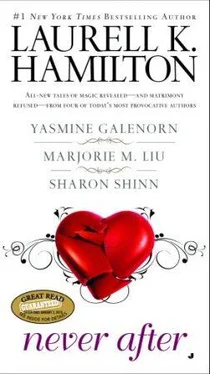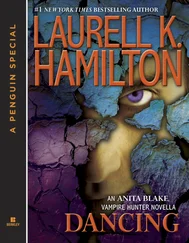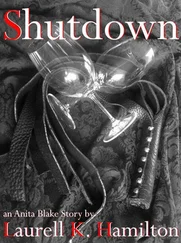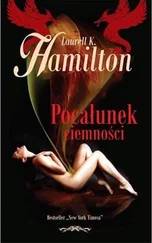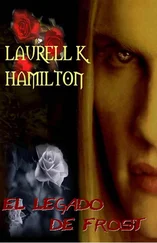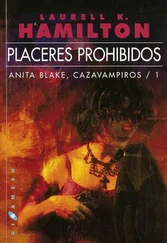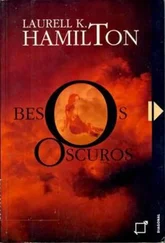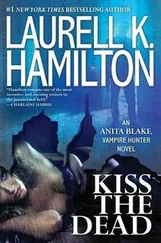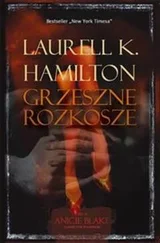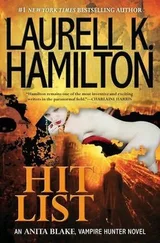Laurell Hamilton - Never After
Здесь есть возможность читать онлайн «Laurell Hamilton - Never After» весь текст электронной книги совершенно бесплатно (целиком полную версию без сокращений). В некоторых случаях можно слушать аудио, скачать через торрент в формате fb2 и присутствует краткое содержание. Город: New York, Год выпуска: 2009, ISBN: 2009, Издательство: Penguin Group, Жанр: sf_fantasy_city, Ужасы и Мистика, на английском языке. Описание произведения, (предисловие) а так же отзывы посетителей доступны на портале библиотеки ЛибКат.
- Название:Never After
- Автор:
- Издательство:Penguin Group
- Жанр:
- Год:2009
- Город:New York
- ISBN:978-1-101-14896-9
- Рейтинг книги:5 / 5. Голосов: 1
-
Избранное:Добавить в избранное
- Отзывы:
-
Ваша оценка:
- 100
- 1
- 2
- 3
- 4
- 5
Never After: краткое содержание, описание и аннотация
Предлагаем к чтению аннотацию, описание, краткое содержание или предисловие (зависит от того, что написал сам автор книги «Never After»). Если вы не нашли необходимую информацию о книге — напишите в комментариях, мы постараемся отыскать её.
Here, for the first time ever, are four stories from today's most provocative authors that take the classic idea of the 'faerie tale wedding' and give it a swift kick in the bustle.
Never After — читать онлайн бесплатно полную книгу (весь текст) целиком
Ниже представлен текст книги, разбитый по страницам. Система сохранения места последней прочитанной страницы, позволяет с удобством читать онлайн бесплатно книгу «Never After», без необходимости каждый раз заново искать на чём Вы остановились. Поставьте закладку, и сможете в любой момент перейти на страницу, на которой закончили чтение.
Интервал:
Закладка:
“Oh, dear.” Sally stared at her father, feeling as though she hardly knew him—quite certain that she did not.
And, since he was suddenly a stranger to her, she had no qualms in grabbing a nearby candle, and jamming it flame first into the tiny portrait he held in his hand. Hot wax sprayed. She nearly set his sleeve on fire. He howled in shock, dancing backward, and slammed his injured hip into the desk. He yelled even louder.
“And that,” Sally said, shaken, “is how I feel about the matter.”
She was sent to her room without supper, which was hardly a punishment, as the idea of food made her want to lean outside her window and add bile to the already bilious moat; which, briefly, she considered jumping into. Unfortunately, she had a healthy respect for her own life, and if the fall did not kill her, swallowing even a mouthful of that stinking cesspool probably would.
So she paced. Ran circles around her chamber, faster and faster, until she had to sit down in the middle of the floor and hold her head. No tears, though her eyes burned. Just a lump in her throat that grew larger and harder, and more sour—until she did bend over and gag, covering her mouth, trying to be quiet so that no one would hear her.
Her father, she thought, was not a bad man. But he was desperate, and had no son, and while that had not bothered him when she was young, now that he was getting on in years—hounded by insipid little squirts invading his borders—he had clearly lost his mind, and his heart, and if she did not control her temper, perhaps some other vital body parts.
Clearly, something had to be done.
Selfish, she thought. You know he needs this alliance. He would not have gone to such extremes otherwise.
Of course not. But that did not mean that she had to put up with it. Being married to a warlord? And not just any warlord, but the Warlord of the South, with his endless army of barbarians, witches, and wolves? Even the horses were said to eat meat (an exaggeration, she knew that for a fact), and the Warlord himself lived in a tent so that he could up and move at the change of the wind, or if a good pillage was scented; and to evade all the assassins sent to take his head. That much was not an embellishment.
She wouldn’t last a week. It was a death sentence.
So go, she thought. Leave your father to his own devices.
Leave the father whom she loved. Betray him to his enemies. Allow him to stand before the envoy of the most hated, villainous man to haunt the South, and say that his daughter had up and run—with apologies for having made the envoy make the trip for nothing. Yes, that would work perfectly.
Sally sighed, pounding her fists against her legs in frustration. She could not do that to her father. But she could not marry the Warlord, either. There had to be another way.
Except there was nothing.
Nothing, unless you turn to magic.
Simple, stupid, magic. Probably her imagination. Magic was something folks whispered about only when they were frightened; and then, if it was dark, only as ghouls and flesh suckers, or men who transformed into wolves. Which wasn’t even magic, in Sally’s opinion. Just other kinds of people. Who probably didn’t exist.
Magic was something else. Magic was power, and thought, and miracle. Magic could spin the threads of the world and make something new. Magic could circumvent the future.
Sally’s mother had dabbled in magic; or that was how Sally remembered it, anyway: small things that her father called eccentricities. Like singing prayers to roses, or speaking to the frogs in the pond as though they were human. Sketching signs over her chest when passing certain trees, or laying her hands upon others, with a murmur and a smile. Cats had enjoyed her company, as did fawns from the wood (although, as the deer on her father’s land were practically tame anyway, that was hardly evidence of the arcane); and sometimes, in a storm, with the lightning flickering around her, she would stand on the balcony in the rain and wind, staring into the darkness as though searching, waiting for something she thought would come.
Which was why she had died, some said. Being in the wind, chilled until a cough had found her; and then fever.
Many little things. Many memories. Her mother had been a witch, according to a very few; born in the heart of the Tangleroot Forest. But Sally knew that was a lie. Her mother had merely lived and died with farsee ing eyes, able to perceive what others could not. Sally wished she had those eyes. Her mother had said that she did, but that was cold comfort now.
If there was such a thing as magic, it was not going to save her. She’d have better luck asking bluebirds or goldfish for salvation.
So Sally went for a walk.
Night had spun around, with stars glittering and the moon tipping the edge of the horizon, glimpsed behind the trees. Sally strode down to the garden, led by habit and soothing scents: lavender and jasmine, roses full in bloom. She passed the kitchen plot, and plucked basil to rub against her fingers and nose; and a carrot to chew on; and listened to pots banging, cooks arguing; and to the wind that hissed, caressing her hair, while frogs sang from the lilies in the pond. Sally followed their croaks, lonely for them; and envious. She felt very small in the world—but not small enough.
Several ancient oaks grew near the water. Some said they had been transplanted as seedlings from what was now the Tangleroot Forest, though after three hundred years, Sally could hardly imagine how anyone could be so certain that was the truth. She had a favorite, though, a sleeping giant with fat coiled roots that were too large for the earth to contain. She imagined, one day, that her gentleman tree would wake, believing he was an old man, and try hobbling away.
Her mother had often laid her hands upon this tree. Sally perched on the thick tangle of his once-and-future legs, bark worn smooth from years of her keeping company with his shadow, and leaned back against the trunk with a sigh.
“Well,” she said. “This is a mess.”
The oak’s leaves hissed in the wind, and then, quite surprisingly, she heard a soft female voice say, “Poor lass.”
Sally flinched, turning—but it was only the gardener who peered around the other side of the massive oak. The old woman held a tankard in her wrinkled hands, her silver eyes glittering in the faint firelight cast by the sconces that had been pounded into the earth around the castle, lit each night and burning on pitch.
“I heard,” said the gardener. “Thought you would come here.”
Sally remembered the first time she had seen the old woman, who looked the same now as she had fifteen years ago when Sally had first tottered into her domain, sticky with pear juice and holding the tail of a spotted hunting dog, her mother’s finest companion besides her daughter and husband. The garden had been a place of wonderment; and the gardener had become one of Sally’s most trusted confidants.
“You’ve always been a friend to me,” she said. “What do you think I should do?”
The old woman pushed back her braids, and took a brief sip from the tankard before passing it on to Sally, who drank deeply and found cider, spicy and sweet on her tongue. “I think you should be useful to yourself.”
“Useful to my father, you mean?”
“Don’t be dense,” she replied. “You know what you want.”
Sally did. What she wanted was simple, and yet very complicated: freedom, simply to be herself. Not a princess. Just Sally.
Except that there was a cost to being free, and in the world beyond this castle and its land, she was useful for very little. She could garden, yes, and cook; or ride a bucking horse as well as a man. But that was hardly enough to survive on. She was Sally, but also a princess—and that had never been clearer to her than now, when she thought of what she might be good for, out in the world.
Читать дальшеИнтервал:
Закладка:
Похожие книги на «Never After»
Представляем Вашему вниманию похожие книги на «Never After» списком для выбора. Мы отобрали схожую по названию и смыслу литературу в надежде предоставить читателям больше вариантов отыскать новые, интересные, ещё непрочитанные произведения.
Обсуждение, отзывы о книге «Never After» и просто собственные мнения читателей. Оставьте ваши комментарии, напишите, что Вы думаете о произведении, его смысле или главных героях. Укажите что конкретно понравилось, а что нет, и почему Вы так считаете.
